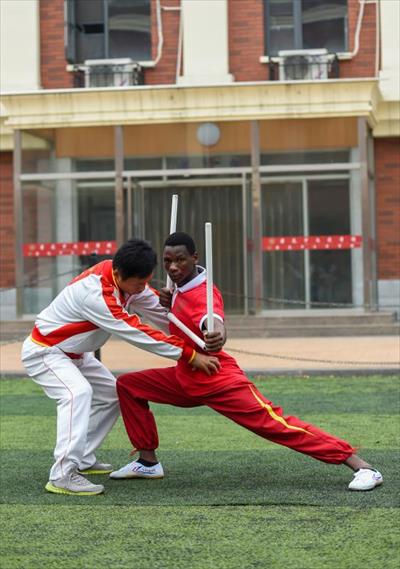|
||||||||||
| Home Nation World Business Opinion Lifestyle ChinAfrica Multimedia Columnists Documents Special Reports |
|
||||||||||
| Home Nation World Business Opinion Lifestyle ChinAfrica Multimedia Columnists Documents Special Reports |
| Africa |
| Alive and Kicking |
| Kenya builds East Africa's biggest kungfu academy as Chinese martial arts gain popularity |
| By Gitonga Njeru | VOL. 9 April 2017 ·2017-04-14 |

Kungfu has been a life-long passion for 21-year-old Kamau Mutunga who recently signed up for martial arts classes after a violent attack left him shaken and distressed.
"I was attacked a while ago by violent thugs; they stole my money, phone, shoes and even the trousers I was wearing. I sustained injures and spent a night in hospital recuperating from my ordeal. I want new skills to be able to defend myself," he told ChinAfrica.
"I also want to be a trainer someday. I admired Bruce Lee as a child," says Mutunga who is also a third-year law student at the University of Nairobi in Kenya.
Mutunga is one of many Kenyans who are overjoyed by the plan to build East Africa's largest Kungfu Academy, expected to be alive and kicking and ready for the public by mid-2017. The academy will recruit and train members and also organize local and international kungfu events.
State of the art facility
At the beginning of 2016, there were only 16 registered kungfu practitioners in the country. This figure rose to more than 350 early this year, representing more than 12 kungfu associations, according to figures from Kenya's Ministry of Sports, Culture and the Arts.
"The first kungfu festival held in Kenya in November last year saw about 12 associations formed and an exchange program for martial artists was held in China in the following months," Jonah Ngoiri, a kungfu trainer and spokesperson for the Kungfu Wushu Association (KWA), told ChinAfrica. "While it [kungfu] may not be as popular as [other martial arts such as] karate, judo or taekwondo [in Kenya], it will surpass those disciplines as construction of East Africa's largest [kungfu] academy is already underway."
According to Ngoiri, KWA has 87 members with most of its funding coming from annual membership fees of $65 per calendar year per member. Additional funds come from ticket sales from local and international events.
"We also get revenue from training fees [from agencies] and so on. We do not have external funding but we currently have many applications from potential members. I can proudly say that 99 percent of our members are Africans while most of the remaining 1 percent are Chinese citizens," said Ngoiri.
KWA is now in talks with government agencies, such as the Kenyan Defense Forces and several branches of the police to integrate kungfu into their training. "We hope this can improve their defense skills," said Ngoiri, adding that once the new facility is complete, training can begin.
Majority of the funds to construct the academy came from the Kenyan Government through its Ministry of Sports, Culture and the Arts. Different kungfu associations are also chipping in to help with costs. According to Ngoiri, the academy construction, located in one of Nairobi's prime areas on a 2-acre piece of land, is estimated to cost a total of $6 million.
Ngoiri says the state-of-the-art facility will include a gym, world-class swimming pool and hi-tech features such as high speed WiFi access. Offices for KWA officials as well as a Chinese restaurant will also be included. The seven-story academy will have the capacity to train 600 new students a year and use imported construction materials from Israel and China.
Chinese influence
The kungfu festival held in Nairobi late last year helped to promote and garner interest for the sport at large. Organized by Chinese pay-for-view television company StarTimes, the festival featured 10 kungfu masters from China performing public demonstrations. StarTimes is a popular channel across Africa that often features kungfu content.
"Basically, it's [a festival] to celebrate the kind of content that is available on this channel, because it is an action-oriented kind of channel and when we did our research we realized that kungfu is very popular among kids and adults in Kenya due to the appeal of kungfu action movies," Alex Mwaura, Communication Manager of StarTimes Kenya told China Global Television News.
"We are excited that kungfu popularity is gaining momentum," said Ngoiri, adding that the academy will make Kenya more competitive compared with other countries with kungfu practitioners.
Kenya's Sports Cabinet Secretary Hassan Wario confirmed that the popularity of kungfu has grown rapidly in just one year.
"We sat down with relevant sports authorities and decided to construct the academy. It will be East Africa's largest academy once completed. It will also attract students from around the world once complete," he told ChinAfrica.
Wairo said while kungfu may not overtake soccer or athletics in popularity (Kenya is a powerhouse in world long distance running), it could rank third as a national sport within a span of three years if the current rate of growth continues unabated.
The government hopes to also rehabilitate street children in partnership with kungfu associations in a move aimed at addressing poverty.
"It is a welcome move and we praise the government for that. We have a lot of wasted talent and it is good to showcase them. It is estimated by the government that there are about 6.2 million homeless children. Our work [with kungfu] will go a long way [to help get these kids off the streets]," said Mutava Kaloki, Secretary General of Yuan Kungfu Association.
(Reporting from Kenya)
|
||
| About Us | Contact Us | Advertise with Us | Subscribe |
| Copyright Beijing Review All rights reserved 京ICP备08005356号-5 京公网安备110102005860号 |